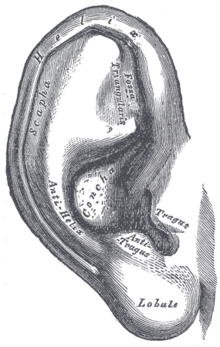Frank's sign


Frank's sign is a diagonal crease in the ear lobe extending from the tragus across the lobule to the rear edge of the auricle.[1] The sign is named after Sanders T. Frank.[1]
It has been hypothesised that Frank's sign is indicative of cardiovascular disease[2][3] and/or diabetes.[4] Some studies have described Frank's sign as a marker of cardiovascular disease but not linked to the severity of the condition.[5] In contrast, other studies have rebutted any association between Frank's sign and coronary artery disease in diabetics.[6] There have also been reported cases of Frank's sign being a predictor of cerebral infarctions.[7] A link between Frank's sign and premature aging and the loss of dermal and vascular fibers has also been hypothesized.[8] Some studies have focused on association between bilateral earlobe crease and coronary artery disease.[9] It is probably prudent to consider Frank's Sign alongside other clinical markers of physiological ageing, rather than utilising it as a stand-alone sign in the identification of coronary artery disease.[10]
Severity
- Grade 3 – A deep crease across the whole of the earlobe.
- Grade 2b – Creased more than halfway across the earlobe.
- Grade 2a – A superficial crease across the earlobe.
- Grade 1 – A small amount of wrinkling on the earlobe.[11]
Notable individuals with Frank's sign
References
- ^ a b Frank ST (August 1973). "Aural sign of coronary-artery disease". N. Engl. J. Med. 289 (6): 327–8. doi:10.1056/NEJM197308092890622. PMID 4718047.
- ^ Mallinson, Tom; Brooke, David (2017). "Frank's Sign as a clinical marker of cardiovascular disease". Journal of Paramedic Practice. 9 (1): 8–10. doi:10.12968/jpar.2017.9.1.8.
- ^ Miot, H.A., Molina de Medeiros, M. etal (2006). Association between coronary artery disease and the diagonal earlobe an preauricular creases in men. Anais Brasileiros de Dermatologia. vol.81 no.1
- ^ Mustafa Ahmed, M.D. (13 August 2014). "Earlobe Crease And Heart Disease – Fact Or Myth?". Abel Healthcare. Retrieved 8 February 2015.
- ^ Lesbre JP, Castier B, Tribouilloy C, Labeille B, Isorni C (January 1987). "[Frank's sign and coronary disease]". Ann Cardiol Angeiol (Paris) (in French). 36 (1): 37–41. PMID 3827155.
- ^ Davis TM, Balme M, Jackson D, Stuccio G, Bruce DG (October 2000). "The diagonal ear lobe crease (Frank's sign) is not associated with coronary artery disease or retinopathy in type 2 diabetes: the Fremantle Diabetes Study". Australian and New Zealand Journal of Medicine. 30 (5): 573–7. doi:10.1111/j.1445-5994.2000.tb00858.x. PMID 11108067.
- ^ Nazzal, Saleh; Hijazi, Basem; Khalila, Luai; Blum, Arnon (April 28, 2017). "Diagonal Earlobe Crease (Frank's Sign): A Predictor of Cerebral Vascular Events". The American Journal of Medicine. 130 (11): 1324.e1–1324.e5. doi:10.1016/j.amjmed.2017.03.059. PMID 28460854.
- ^ George Griffing, M.D. (March 2014). "Frank's Sign". The New England Journal of Medicine. 370 (15): e15. doi:10.1056/NEJMicm1213868. PMID 24597888.
- ^ Evrengül H, Dursunoğlu D, Kaftan A, et al. (2004). "Bilateral diagonal earlobe crease and coronary artery disease: a significant association". Dermatology. 209 (4): 271–5. doi:10.1159/000080847. PMID 15539887. S2CID 26858693.
- ^ Mallinson TE, Brooke D (2017). "Limited Diagnostic Potential of Diagonal Earlobe Crease". Ann Emerg Med. 70 (4): 602–603. doi:10.1016/j.annemergmed.2017.06.013. PMID 28946988.
- ^ "Frank's Sign – Diagonal earlobe crease (DELC)". Stanford Medicine. July 2, 2015. Retrieved January 1, 2021.
- ^ Livingston, David (November 29, 2018). "Dick Van Dyke (age 92), Premiere Of Disney's 'Mary Poppins Returns' - Arrivals". gettyimages.com. Getty Images. Retrieved November 30, 2018.
- ^ a b Lindsay, Jessica (March 27, 2018). "If you have this mark on your ear, it could be a warning you have heart disease". Metro. Retrieved January 1, 2021.
- ^ Wachs, Daliah (August 29, 2018). "Deep Forehead Wrinkles May Suggest Heart Disease Risk". KDWN. Retrieved January 1, 2021.